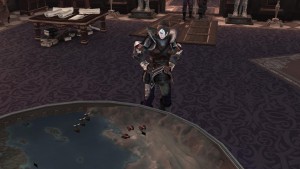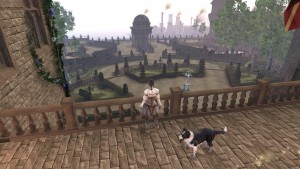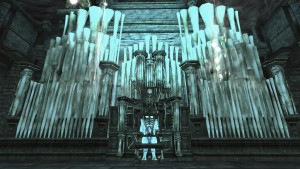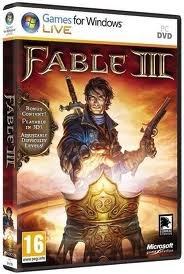 The term “role-playing game” is not about a character sheet. By this fact Fable III shows the fig to all the story-driven action, adventure and/or hack’n’slash games that try to make you believe they have something to do with the CRPG genre, just because they have a character creation and/or development system.
The term “role-playing game” is not about a character sheet. By this fact Fable III shows the fig to all the story-driven action, adventure and/or hack’n’slash games that try to make you believe they have something to do with the CRPG genre, just because they have a character creation and/or development system.
Here and now we can tell they have not. Because the lack of character creation one can believe Fable III is more like a JRPG, but the similarity stops here. You don’t have to play through a linearly written story — of course, there is a story, but most of the time you can go forward as you wish, and a lot of things depend on your actions. Let me tell that 30% of the game is story, one fifth of it is combat, and the rest (you count it right: half of it) is partly treasure hunt, partly a free associating social RPG.
Unfortunately, the second episode wasn’t released on PC, but in its time the first Fable squarely showed that combat is only a necessary but not basic element of a fantasy game. Opponents could be defeated easily, so combat couldn’t hinder you in exploring the story, which was an essential hero tale. The mere slip of a boy became a powerful hero that cleaned his homeland by weapons and magic. This was a simple but perfect foundation spiced with some fashioning, posing, love (even between the same sexes) and chicken kicking. In Fable common people are not just garnish for the main meal but organic parts of the interaction between the player character and the world.
 In the third installment this was lifted to such a high level that literally amazed me. Fable III supplied me with everything I felt missing from CRPGs in general: You can be friends, you may run errands, you can love each other, fuck (The Legendary Condom of the Gods +5 — no comment), get married, maybe you get an STD, give birth to a bastard, etc. Or you can go on the other way and build your kingdom on intimidation, sacking and tyranny.
In the third installment this was lifted to such a high level that literally amazed me. Fable III supplied me with everything I felt missing from CRPGs in general: You can be friends, you may run errands, you can love each other, fuck (The Legendary Condom of the Gods +5 — no comment), get married, maybe you get an STD, give birth to a bastard, etc. Or you can go on the other way and build your kingdom on intimidation, sacking and tyranny.
Because you will be a king or queen, and that’s not the end of the story. According to the Prophecy you must become a Hero, you must prove that your father (the last Hero, who finally became the king of Albion) did not spread his seeds into a female womb vainly, and you have to defeat your evil big brother on the throne.
As it is a custom in better stories, nothing is black or white. Being evil or good when you sit on the throne is not the only question — then comes the “How will you fulfill the Prophecy?” In this point it’s hard to avoid spoilers, so I tell you only that between the extremes of giving or tyrannic reign there are a lot of possibilities in governing the country.
 It seems, money is moving not only our world but Albion too. You have to get a considerable wealth to make the endgame favorable for everyone, and although there is a way to walk on the path of richness from the beginning of the game, it is not wiped into your face. You need to find the opportunity — and in the end you can be a very rich and very popular king or queen. But if you have not enough money it becomes questionable that the old building in Bowerstone becomes a brothel or an orphanage? Will the children of the poor go to school or will they go to a factory to work? Would the guard be axed or raised to hold back banditry? Will Albion conquer the neighboring nation or will your kingdom be in league with it? You can raise or lower the amount of treasures and your popularity by these and such decisions. Besides, you can go adventuring even if you are already the king or queen of Albion, and of course, you will find new adventures.
It seems, money is moving not only our world but Albion too. You have to get a considerable wealth to make the endgame favorable for everyone, and although there is a way to walk on the path of richness from the beginning of the game, it is not wiped into your face. You need to find the opportunity — and in the end you can be a very rich and very popular king or queen. But if you have not enough money it becomes questionable that the old building in Bowerstone becomes a brothel or an orphanage? Will the children of the poor go to school or will they go to a factory to work? Would the guard be axed or raised to hold back banditry? Will Albion conquer the neighboring nation or will your kingdom be in league with it? You can raise or lower the amount of treasures and your popularity by these and such decisions. Besides, you can go adventuring even if you are already the king or queen of Albion, and of course, you will find new adventures.
There is another thing worth to remark: Fabel series was always soaked in some fine English humor. Aside from such genre reflections as ‘The Game’ — in which you shrink to tiny and find yourself on a board with finely wrought environment and paper-maché figures who you can talk to, and so you can play a classic, ‘save the princess’ type of adventure — you can find lots of nutty ideas during your adventures, so sometimes smiling is an elementary reaction. The voice acting of John Cleese as your royal butler is an extra experience.
 This is a very fine game, it is all right. If you want I can tell that enemies are not too diversified, the game varies the power level of some basic types. There are a few side-quests in which it is terribly hard to find the necessary items (e.g.: 30 books for the academy), and completionists are forced (!) to go online and play the multiplayer mode. Admit it; these are just some straining at a gnat.
This is a very fine game, it is all right. If you want I can tell that enemies are not too diversified, the game varies the power level of some basic types. There are a few side-quests in which it is terribly hard to find the necessary items (e.g.: 30 books for the academy), and completionists are forced (!) to go online and play the multiplayer mode. Admit it; these are just some straining at a gnat.
By the way, the forced multiplayer is not such a pain. If you don’t want to collect all the weapons and open all the Demon Doors in the game, you may ignore it at all. But if you are a maximalist, then you must hold your child’s hand and lead the kid to a certain Demon Door (you cannot hold other children’s hand), you must tell your love to another player character in front of another Demon Door, and you must sell and buy weapons to and from other players.
And I must play this game again to become an evil hero and tyrannic potentate.
—Garcius—
 Publisher: Microsoft Game Studios
Publisher: Microsoft Game Studios
Developer: Lionhead Studios
Homepage: http://lionhead.com/fable-3/
Style: social RPG
What I liked:
social interactions
humor
and the whole game in general
What I didn’t like:
the experience is great but not everlasting


No comments
Trackbacks/Pingbacks